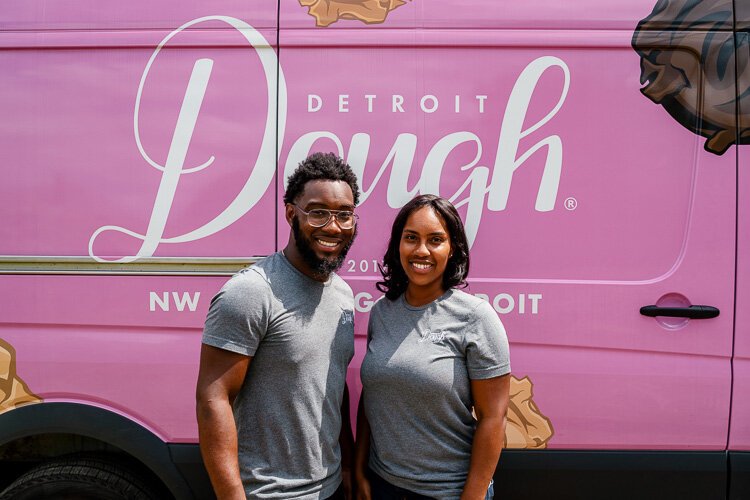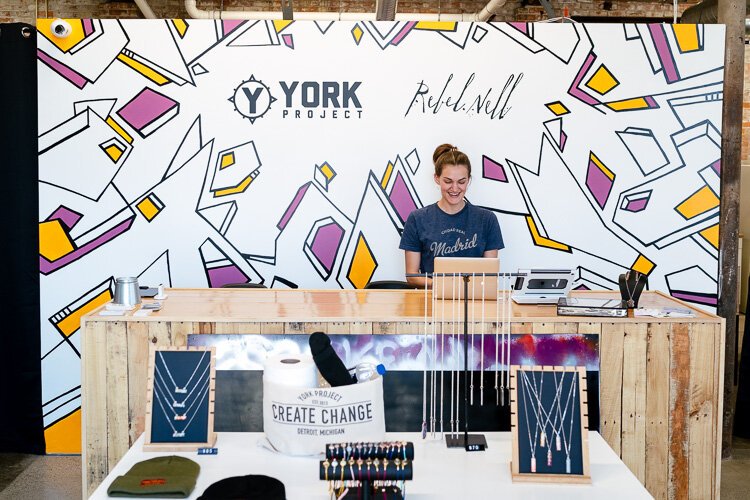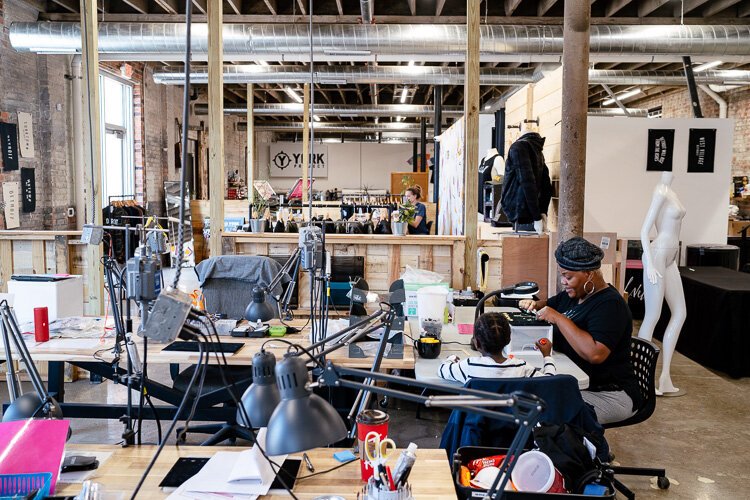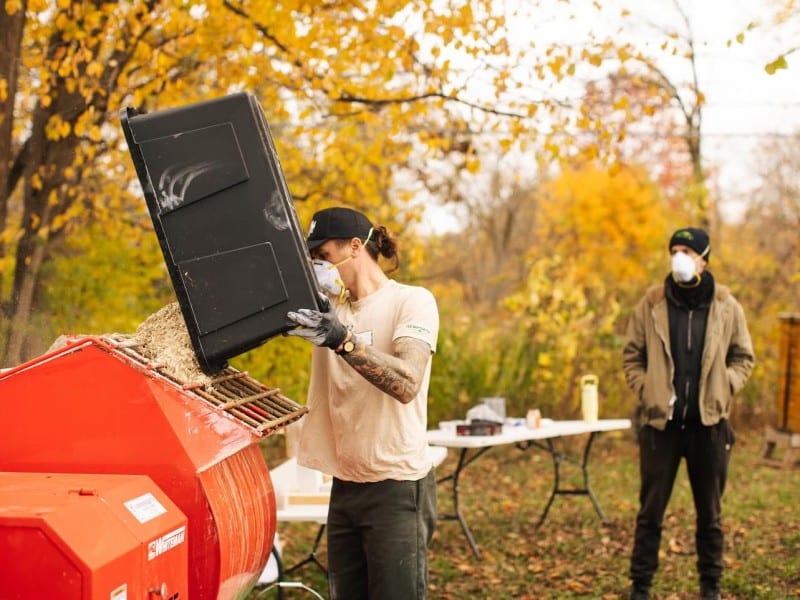The social entrepreneur effect: How 3 mission-driven businesses are giving back to Detroit
Here's how an edible cookie dough company, a graffiti jewelry maker, and streetwear clothing line are putting down roots and engaging with their community.
Detroit is changing—that much is agreed upon. But how to make those changes beneficial for everyone, including the lifelong residents and newer residents alike, as well as businesses, is a bit trickier.
In the NW Goldberg community on the west side, the neighborhood encompassed by the John C. Lodge and I-94 expressways, West Grand Boulevard, and Grand River Avenue, is grappling with those changes. This westside neighborhood (also known as Zone 8) has a long and storied history as the home of the Motown Museum, King Solomon Baptist Church, and Detroit Collegiate Prep at Northwestern High along with one of the largest medical centers in Michigan, Henry Ford Health System.
“We’ve done a lot of support for planning work in that area, working with neighbors and the city to set the tone for a lot of important development,” says Tom Habitz, Henry Ford Health System’s urban planner. “We’ve unofficially adopted the area. The purpose is to stimulate further investment and growth in Northwest Goldberg.”
Habitz says the vision of Metro Detroit’s fifth-largest employer is to “support the local economy and entrepreneurs.” One way is by hand picking developers with the same community-minded goals along with investing money in improving streets, opening community spaces, and cooperating with initiatives like parking. One example is the new Holden Block development, which houses Rebel Nell and York Project.
Also in the neighborhood is Detroit Dough, . Daniel Washington, co-founder of Detroit Dough and the founder of community development organization NW Goldberg Cares, says he remembers a different time in the neighborhood he grew up in. “I remember a local bodega that gave you fresh food but that’s no longer here. It was owned by an African American family. I remember a gas station; that’s no longer there.”
“In general, I remember a time when the streets were dotted with families that you knew and recognized,” he says.
That’s why he started NW Goldberg Cares in 2017, then called Original Creativity. And while volunteers have helped transform parks and plant community gardens, Washington says the organization’s mission is bigger than swing sets and fresh vegetables.
“Our real aim and goal are to improve the lives of residents in the neighborhood by attracting business and retaining them and ensuring a family-friendly neighborhood,” he says.
With Detroit Dough, Rebel Nell, and York Project calling the neighborhood home, here’s how they are giving back.
Rebel Nell
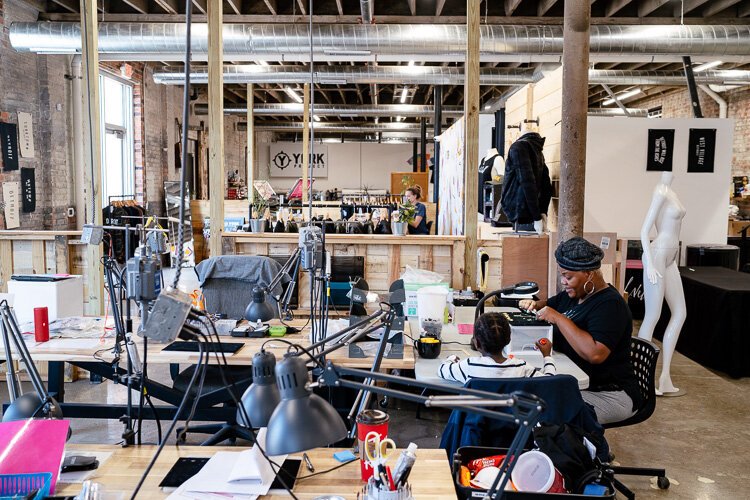
Rebel Nell hires women who are transitioning into stable housing and who face other barriers to employment to transform fallen graffiti into wearable art.
“Our mission is to employ, educate, and empower women transitioning out of shelter living,” says Amy Peterson, co-founder and CEO of Rebel Nell.
It’s common to see their necklaces and earrings at pop-up markets throughout Detroit and their products on display at other small businesses. Choosing a location for their only retail and factory space last year was a big deal.
“For us, when we’re looking at space, we focus on the women we employ. Accessibility is first and foremost,” Peterson says.
“The neighborhood has been such a haven for artists and creatives,” she says. “That made a lot of sense for us, and I think with our designers being so creative, it’s an inspiring environment to be around.”
Now as the business approaches its year anniversary in the neighborhood, Peterson says they’re starting to put down deeper roots and are looking for new ways to get involved.
“We’re getting to know our neighbors more and more and finding cool ways to do things with them,” Peterson says. “We had a huge holiday market to attract vendors and retail shoppers to explore the neighborhood and we had a lot of vendors from the neighborhood. It was a cool opportunity to include our neighborhoods.”
Peterson says she’d like to see the business branch even more into the neighborhood over the next year.
“I think it’s on us to get out there and like the holiday market, we were able to use our space to draw people to this area and meet more of them,” she says.
The York Project
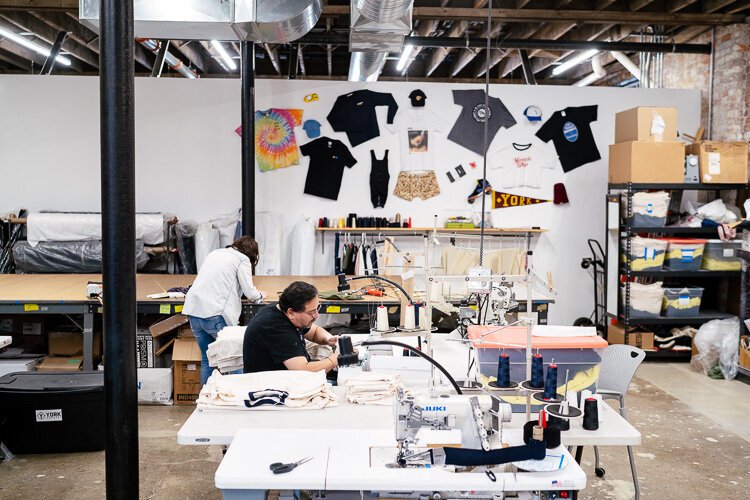
The York Project, which shares its space with Rebel Nell, designs and sells streetwear-influenced clothing. Like Rebel Nell, there’s a social component to the business. It institutes a one-for-one policy: for every product sold, they donate a bag of necessities (including toilet paper, socks, and bottled water) to those who need them.
So far, they’ve donated $103,000 worth of goods in 23 cities, (though in 2020 founder Josh York says they’re refocusing on giving approximately 95 percent to those in Detroit).
York says moving to the neighborhood was a decision made in part because he thought it was a “cool spot,” citing the influx of investment coming in.
“We got really excited about where the neighborhood was heading,” York says.
Since moving to the community nearly a year ago, York says his business has participated with NW Goldberg Cares to help with cleaning up parks and buildings in the neighborhood.
“It’s all them, and we support it,” he says. “NW Goldberg Cares has been the biggest thing. They’re making it more of a neighborhood versus a bunch of houses.”
Detroit Dough
While Detroit Dough, a company that makes safe-to-eat raw cookie dough sold in major movie theaters and Little Caesars Arena, doesn’t have a retail space in the neighborhood, co-founder Daniel Washington considers them to be headquartered in the neighborhood. The business donates 5 percent of all sales back to the neighborhood.
“For us, it’s specifically about our neighborhood, because the reality is it’s disenfranchised,” says Washington. “We’re putting our money where our mouth is. No matter what, 5% goes to the neighborhood.”
Washington says three other major businesses or organizations have been an important part in the neighborhood for over 100 years each: Cole Funeral Home, The Detroit Fire Extinguisher Company, and Henry Ford Hospital. He says the family-owned businesses and the health system provide the framework for how new members of the community can give back.
“Detroit Dough, Rebel Nell, York Project…for us all, we understand that being a good business is more than just doing ‘good business’ — it’s about providing more and that’s why we all pledged something uniquely,” he says.
This article is part of our Equitable Development series, in partnership with Henry Ford Health System, where we explore neighborhood progress and impact of Henry Ford Health System and community partners. Stories illustrate growing an inclusive Detroit in a way that allows people from all races, classes, and abilities to participate and benefit.
